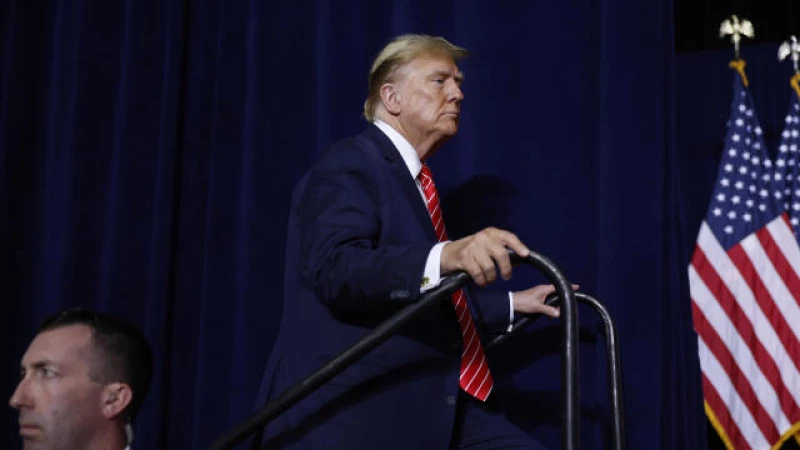Washington — Former President Donald Trump made a plea to the Supreme Court on Tuesday, arguing that former presidents should be shielded from criminal prosecution for actions taken while in office. Trump's legal team contended that the absence of criminal charges against any former or current president since 1789 illustrates that such authority does not exist.
Trump's lawyers stated, "The president's ability to effectively govern and the independence of the presidency itself would be compromised if a president could face criminal prosecution for official actions after leaving office."
In a detailed 51-page document, attorney D. John Sauer urged the Supreme Court to overturn a lower court's ruling that dismissed Trump's immunity claim and demanded the dismissal of the pending charges against him.
Sauer emphasized that the implications of the Supreme Court's verdict on presidential immunity extend beyond Trump and will have lasting consequences on the institution of the presidency. He warned against establishing a precedent that appears to be tailored specifically for President Trump, as it would undermine the principles of the legal system.
The Immunity Debate: A Legal Showdown
In a recent development, the Supreme Court has agreed to revisit a ruling made by the federal appeals court in Washington. This ruling determined that former President Trump could potentially face prosecution for his alleged actions to undermine the transfer of power following the 2020 election. The scheduled arguments for this case are set for April 25.
At the heart of the matter lies a crucial question that the justices are deliberating: to what extent does a former president retain immunity from criminal prosecution for actions carried out during their time in office? Notably, the court is not examining Trump's assertion that presidents can only be criminally charged post-impeachment by the House and conviction by the Senate.
Special counsel Jack Smith, leading the prosecution against Trump, has contended that the former president engaged in deceptive practices to maintain his position in the White House. Smith has cautioned that granting immunity to Trump for his efforts to overturn the election results goes against fundamental constitutional principles and poses a threat to democracy. A brief from Smith is expected by April 8.
While the Supreme Court has previously ruled that presidents are shielded from civil liability, the current case raises the unprecedented issue of whether a former president can be held criminally accountable for actions taken in an official capacity. Trump, as the first former president to face indictment, has entered a plea of not guilty to all charges.
The Supreme Court's Impact on Trump's Criminal Prosecutions
As the Supreme Court deliberates on the immunity issue, its effects are being felt in two separate criminal cases involving former President Trump.
In a New York state court, Trump, who has pleaded not guilty to charges of falsifying business records, has requested a trial delay pending the Supreme Court's ruling on his immunity from prosecution.
Meanwhile, in South Florida, Trump faces 40 counts related to mishandling government documents post his White House tenure. He is pushing for the charges to be dropped based on immunity grounds and has maintained his not guilty plea.
Legal proceedings in a Washington D.C. case have been halted since December as Trump contests a ruling denying him broad immunity. The case will remain paused until the Supreme Court issues its decision, expected by June's end. A ruling favoring Trump would halt the prosecution in Washington, while a decision against him could lead to a trial possibly impacting the 2024 presidential election, where Trump and President Biden are the presumptive nominees for their respective parties.
Smith had petitioned the Supreme Court in December to step in regarding the dispute on whether Trump can be charged with a crime, however, the justices opted not to expedite the case, allowing the federal appeals court to address it first.
In early February, a three-judge panel decided that Trump does not have immunity from federal prosecution for "supposedly 'official acts.'"
"For the purposes of this criminal case, former President Trump is now citizen Trump, with all the defenses of any other individual facing criminal charges," the panel, made up of Judges Karen LeCraft Henderson, Michelle Childs, and Florence Pan, stated in their opinion.
The D.C. Circuit granted Trump until Feb. 12 to request the Supreme Court to halt the decision, leading to the current face-off before the justices.
This case is one of many involving Trump that the high court is reviewing. Just recently, the justices overturned a landmark decision from the Colorado Supreme Court that mandated Trump's removal from the state's presidential primary ballot under a less-known provision of the Constitution.
The court unanimously decided that states cannot prevent Trump from appearing on the ballot using Section 3 of the 14th Amendment, although four of the justices disagreed with the majority's conclusion that only Congress could enforce the clause.
The upcoming Supreme Court session on April 16 will focus on the interpretation of a federal obstruction law that has been applied in numerous cases related to the events of January 6, 2021, at the U.S. Capitol. Former President Trump is among those accused of violating this law, and the court's ruling will have a significant impact on the outcome of his case and others like it.







